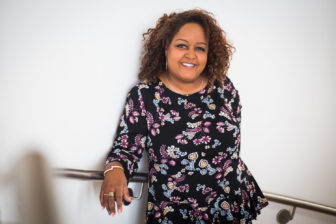
Photo: Nina Weymann Schulz (nina-weymann-schulz.com)
“Knowing how to conduct an interview takes skill and a little luck. Sometimes a lot of luck,” said NPR investigative correspondent Cheryl W. Thompson at the 11th Global Investigative Journalism Conference. “But you also have to ask the right question at the right time.”
And that takes preparation.
Thompson and fellow panelist Scott Zamost, a senior investigative producer at CNBC, shared their tips for keeping your cool and mastering tough interviews.
Develop a strategy. “That means going into the interview knowing the information that you want,” Thompson said. “It also means knowing what concerns the person may have about talking to you and how you are going to defuse it. You also need a ready answer and a truthful one when the subject asks what the story’s about without compromising the investigation.”
Become an expert. In 2018, Thompson published an investigation into the unsolved murders of six black girls in Washington D.C. in the 1970s. “The first thing I did before interviewing anyone was to learn everything I could about the case and each of the six girls,” Thompson said. She read news articles and witness statements and called sources to get background information. “I did anything that I thought would prepare me for landing these tough interviews with family members who I was asking to re-live painful events that they had buried,” she said. “I needed to ask solid and tough questions and learn everything I could about the murders that would help me better write this story.”

Cheryl W. Thompson is an investigative correspondent for NPR. Photo: Nina Weymann Schulz (nina-weymann-schulz.com)
Craft your questions in advance and write them down. “Chances are, you’ll have a lot of them and it is too difficult to listen to your subject’s response while thinking of the next question,” Thompson said. “Having them written down allows you to really listen to the person without losing track of the direction of your interview.”
Never lead with your toughest question. Though, “if you only have one shot at a question, ask the one you need,” she said.
Be persistent. “‘No means nothing to me, that just means come back another day,” Thompson said.
But always be polite and respectful. “Say, ‘All I want to do is tell the full story,'” Zamost suggested.
Shut up. “Bob Woodward likes to say, ‘let the silence suck out the truth,’” Thompson said. “No one likes an awkward silence.” Your interviewee is likely to keep talking.
Ask open-ended questions. “Just ask people, ‘tell me about that day, tell me about that person,’” said Thompson. “It’s a great way to open up conversation.”
Make sure your questions are specific. “Vague questions elicit vague answers,” Thompson said.
It can help to play dumb. “People like to show you how smart they are,” said Thompson. “If you play like: I don’t know anything, can you inform me? People are always willing to do that.”
Always be honest with your subject. “People can sense it,” said Thompson. “You have to be genuine.”
Always let the subject have the last word. “Ask if there is something they’d like to add or they forgot to tell you,” Thompson said.
Take good notes, use a recorder and transcribe your interview right away. “As time goes on, you will forget things,” Thompson said. “If you take notes like I do, you can’t read them after a week.”
 Brenna Daldorph is a freelance audio producer and journalist, based in London (after growing up in Kansas and spending many years in Paris). She often works for PRI’s The World and The Guardian. Many of her stories focus on trauma and resilience among children and young people. In the past few years, she’s reported from Kenya, the Central African Republic, and Nigeria. More than anything else, she has a penchant for stories about people.
Brenna Daldorph is a freelance audio producer and journalist, based in London (after growing up in Kansas and spending many years in Paris). She often works for PRI’s The World and The Guardian. Many of her stories focus on trauma and resilience among children and young people. In the past few years, she’s reported from Kenya, the Central African Republic, and Nigeria. More than anything else, she has a penchant for stories about people.
